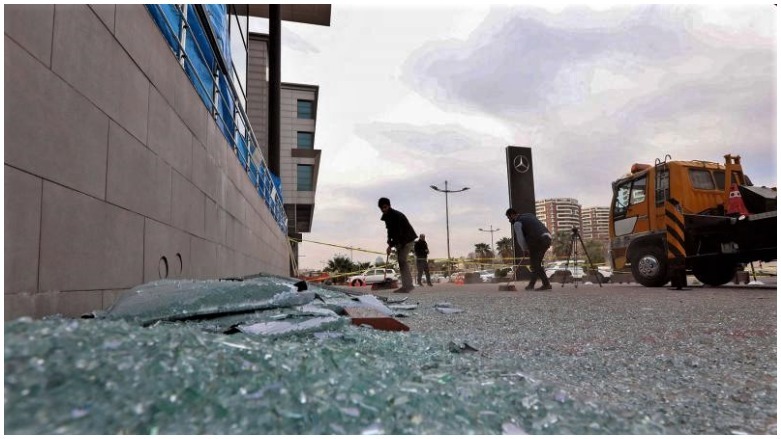US coordinates with Europe on Erbil attack, awaits results of investigation, before assigning blame

WASHINGTON DC (Kurdistan 24) – The US Secretary of State, along with the French, German, Italian, and British Foreign Ministers, issued a statement on Tuesday, condemning Monday’s rocket attack on Erbil International Airport.
The joint statement underscored the Biden administration’s commitment to multilateralism, marking a clear contrast with the Trump administration.
Administration officials also declined to speculate on which party might have been responsible, despite reporters’ repeatedly suggesting that it was probably Iran. Instead, Instead, they stated that they would wait for the results of the investigation, which is to be conducted jointly between the federal government and the Kurdistan Regional Government (KRG.)
Read More: Sec State Blinken pledges US support on Erbil attack in discussion with PM Barzani
The administration’s studied neutrality—as if it were a juror in a US criminal trial—arguably, risks encouraging Tehran to believe it will be able to get away with further attacks. After all, investigations take time, and they may never reach a definitive conclusion.
As Behnam Ben Talebu, a senior fellow at the Foundation for Defense of Democracies, affirmed to Kurdistan 24, the “attacks are entirely consistent with existing patterns and methods of Iranian escalation in Iraq,” while he warned that Iran’s Supreme Leader, Ayatollah Ali Khamenei, “and the diverse array of Shiite militias are testing the resolve of the Biden administration in Iraq.”
Joint French, German, Italian, UK and US Statement
“We the foreign ministers of France, Germany, Italy, the United Kingdom, and the United States of America condemn in the strongest terms the February 15 rocket attack in the Iraqi Kurdistan Region,” they stated, offering “our condolences to the victims, their families, and the Iraqi people.”
“Together, our governments will support the Government of Iraq’s investigation into the attack, with a view to holding accountable those responsible,” the foreign ministers said. “We are united in our view that attacks on US and Coalition personnel and facilities will not be tolerated.”
Secretary Blinken encourages Prime Minister al-Kadhimi to “work closely” with KRG
US Secretary of State Antony Blinken also spoke with Iraqi Prime Minister Mustafa al-Kadhimi on Tuesday. Blinken “conveyed his outrage at the multiple rocket attacks” and sent condolences to those who had been injured, both Iraqi civilians and Coalition members, and the “family and loved ones” of the contractor who had been killed.
Blinken also discussed with Kadhimi “his call with Kurdistan Regional Government Prime Minister Masrour Barzani” on Monday and encouraged the Iraqi Prime Minister “to continue to work closely with the regional government to address violent extremists.”
They also “discussed efforts underway to identify and hold accountable the groups responsible for yesterday’s attacks, as well as the Iraqi government’s responsibility and commitment to protect US and Coalition personnel in Iraq at the government’s invitation to fight ISIS.”
State Department, White House Reaffirm: We wait for Investigation
Different agencies of the US government usually speak in the same voice, and that was certainly the case on Tuesday regarding the rocket attack on Erbil.
The articulation of the US position was led by Blinken, himself, who was interviewed on Tuesday by National Public Radio. He was asked, “In the past, the US has blamed similar attacks on Iran-backed forces. Do you see this as Iran testing a new US administration?”
Blinken responded that the US was assisting the Iraqi investigation and stated, “We need to find out who’s responsible. We don’t, at this point, know.”
“Certainly, we’ve seen these attacks in the past,” he continued. “We’ve seen Iraqi militia, Iranian-backed militia in many cases, be responsible. But to date, it’s too early to know who is responsible for this one.”
That position was stated earlier in the day, by both the White House and State Department Spokespersons.
At the White House briefing, Spokesperson Jen Psaki was asked about the assault on Erbil. The reporter began with the observation, “Iraqi officials have said that the group that took responsibility for that attack has ties to Iran,” before asking: Have you “made that determination as well?” and “What kind of retaliation would be considered?”
Psaki responded, “We’re still working through attribution with our Iraqi partners,” before expressing US outrage at the attack and extending her condolences.
The reporter came back, “Do you expect that there would be retaliation,” once that determination is made?
“As always, the President of the United States and the administration reserves the right to respond in the time and the manner of our choosing,” she replied, “but we’ll wait for the attribution to be concluded first, before we take any additional steps” or “have any additional announcements.”
“Diplomacy is a priority with this administration,” she continued, “and something that is front and center to our engagement with our global partners around the world.”
The State Department briefing was similar. A journalist noted that the rocket attack has been “blamed by many people—even if not you specifically yet—on Iranian-backed militia,” before asking, “if you’re having any second thoughts.”
“We have been in close contact with Kurdish officials, with Iraqi officials, to determine who ultimately was responsible,” Spokesperson Ned Price responded. “We are supporting our Iraqi partners in their efforts to investigate these attacks, whether they were conducted by Iran, whether they were conducted by Iranian-backed militia forces or elements of such forces; we’re not going to prejudge that.”
“We will, in coordination with our Iraqi partners, reserve the right to respond at a time and place of our choosing; and we will do so in coordination with our Iraqi partners,” he concluded.
Whether that will suffice to deter another attack remains to be seen.
Editing by John J. Catherine